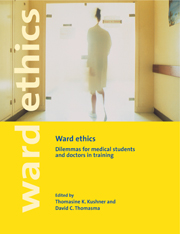Book contents
- Frontmatter
- Contents
- Acknowledgments
- List of contributors
- Prologue. Breaking the silence
- Letter from a young doctor
- Part I On caring for patients
- Section 2 Problems in truth-telling
- Section 3 Setting boundaries
- Part II On becoming a “team player”: searching for esprit de corps and conflicts of socialization
- Section 5 Argot, jargon, and questionable humor: assuming the mantle at the patient's expense
- Section 6 Making waves: questioning authority and the status quo
- 17 Personal identity
- 18 Duties to treat?
- 19 Hierarchy and the dynamics of rank
- 20 Conflicts of interest
- Section 7 Perceiving misconduct and whistle-blowing: observing peers or superiors commit an act deemed unethical
- Epilogue: Using this book
- Glossary
- Index
18 - Duties to treat?
Published online by Cambridge University Press: 05 February 2015
- Frontmatter
- Contents
- Acknowledgments
- List of contributors
- Prologue. Breaking the silence
- Letter from a young doctor
- Part I On caring for patients
- Section 2 Problems in truth-telling
- Section 3 Setting boundaries
- Part II On becoming a “team player”: searching for esprit de corps and conflicts of socialization
- Section 5 Argot, jargon, and questionable humor: assuming the mantle at the patient's expense
- Section 6 Making waves: questioning authority and the status quo
- 17 Personal identity
- 18 Duties to treat?
- 19 Hierarchy and the dynamics of rank
- 20 Conflicts of interest
- Section 7 Perceiving misconduct and whistle-blowing: observing peers or superiors commit an act deemed unethical
- Epilogue: Using this book
- Glossary
- Index
Summary
CASE
“Unnecessary personal risk”
I was a medical student when I observed the following case scenario. A 38-year-old woman came into the Emergency Department complaining of a “terrible headache.” She had not been feeling well the previous week and admitted to having a cough, fever, chills, and occasional bouts of nausea and vomiting. She was accompanied by her boyfriend who said she had been “acting funny” in the days prior to admission. The patient was a regular heroin and cocaine user and had been using the drugs over the past few days.
Lab tests revealed that the patient was HIV positive. Her prognosis was grim, the attending speculated she would only live another 6 to 12 months.
The patient was admitted to the General Medicine Service. Over the next few days the patient underwent extensive testing to determine if she had any other diseases likely to affect an immunocompromised patient. She was treated with a variety of IV medications. During the course of her stay, she began to complain of shortness of breath. After examining the patient, the medical resident asked the medical student to draw an arterial blood gas (ABG) from the patient.
- Type
- Chapter
- Information
- Ward EthicsDilemmas for Medical Students and Doctors in Training, pp. 178 - 182Publisher: Cambridge University PressPrint publication year: 2001



